Understanding the Side Effects of Deworming Your Dog
Deworming your dog, especially puppies, provides far more benefits than risks. However, it may cause mild side effects like vomiting, gastrointestinal upset, or a temporary lack of appetite. After being dewormed, monitor your pet closely to ensure they don’t suffer. The benefits of deworming greatly outweigh these minor side effects, keeping your dog healthy and thriving.
Table of Contents
ToggleWhat is Deworming?
Deworming is a veterinary practice to remove internal parasites like worms, ensuring your dog’s health and happiness. It prevents infestations, protects other pets and humans, and requires proper dosage based on your dog’s weight. Regular deworming and recognizing symptoms help maintain a healthy pet, while awareness of side effects ensures informed care.
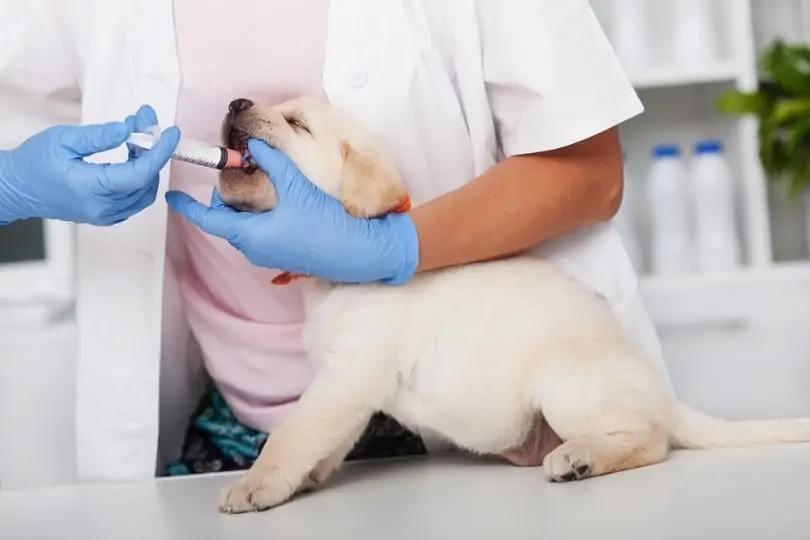
Deworming Procedures and Medications
What is the Deworming Procedure?
Deworming is vital for protecting your dog’s health, targeting parasites like roundworms, hookworms, whipworms, and tapeworms that weaken their immune system and pose risks to your family, especially children.
Starting deworming at 2 to 4 weeks of age and following a regular schedule based on the dog’s lifestyle and environment ensures their health while reducing the risk of human transmission.
Common Medications and Methods
Effective dog dewormers, including tablets, chews, and liquids, treat and prevent parasite infections. Regular deworming paired with pet insurance for preventative care ensures your furry friend stays happy, healthy, and free from internal parasites.

The Significance of Deworming
Deworming is a crucial practice that targets internal parasites such as roundworms, hookworms, whipworms, and tapeworms to protect your dog’s immune system, growth, and overall health. Puppies are particularly vulnerable, often acquiring parasites from their mothers or contaminated environments.
A proactive schedule starting at 2 to 4 weeks old and continuing regularly as dogs mature into adulthood helps prevent parasite infestations. Tailoring deworming frequency to your dog’s lifestyle and seeking veterinary advice reduces the risk of transmission to other pets and humans, ensuring a healthier environment for all.
Signs of Worm Infestations
Recognizing Symptoms
Deworming is an essential aspect of responsible pet ownership, ensuring the health and well-being of your furry companions. Recognizing the early signs of worm infestations helps you take timely action to protect your dog. These symptoms indicate the presence of internal parasites, which require immediate attention.

Symptoms of Worm Infestations:
- Vomiting and diarrhea
- Visible worms in stool or around the anus
- Weight loss despite normal eating
- Bloated or distended belly
- Lethargy or low energy levels
- Excessive scratching or licking near the tail area.
Veterinary Diagnosis
A veterinarian plays a vital role in diagnosing and prescribing the safest deworming products for your dog. Depending on the type of intestinal parasites, treatments may include oral medications, injections, or topical treatments.
These dewormers work by either dissolving the worms in the intestinal system or paralyzing them, causing them to detach from the intestinal tissue and pass through the stool or vomit.
Regular veterinary care ensures your pet receives the treatment they need to stay healthy and free from parasites.
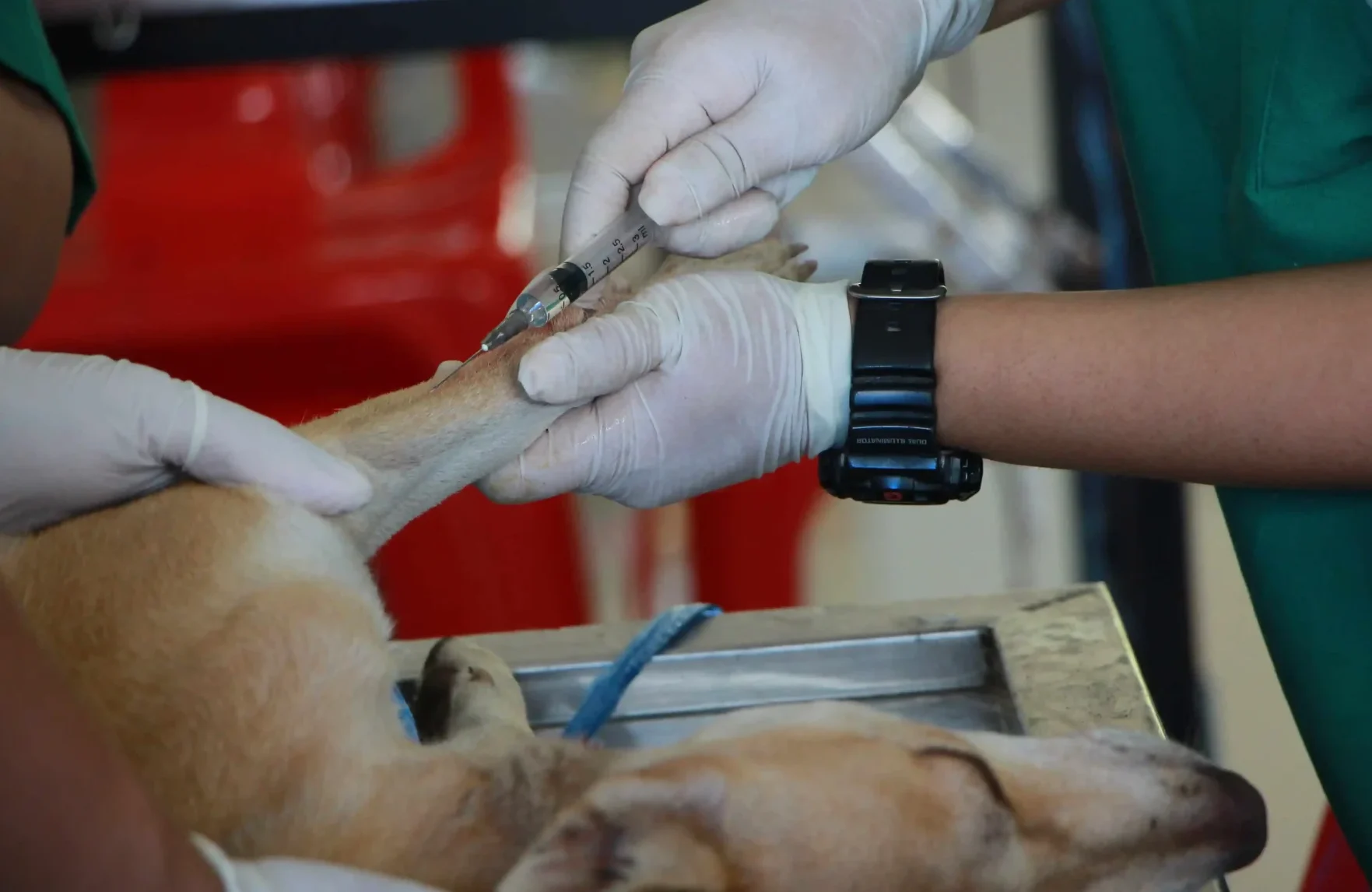
Click here to read about Senior dog drinking water but not eating in which we unveil the secrets of why your dog might not be eating food properly.
Potential Side Effects of Deworming
Deworming is essential for removing intestinal parasites, but it may cause some mild and temporary side effects in dogs. These effects typically occur as the medication targets and eliminates worms, and your dog’s system adjusts. Here are the common side effects to watch for:
-
Digestive Disturbances
- Vomiting and diarrhea are common as the medication acts on the parasites.
- Stomach upset may occur but usually resolves within a day.
-
Inappetence
- Some dogs may experience a lack of appetite or refuse to eat post-deworming.
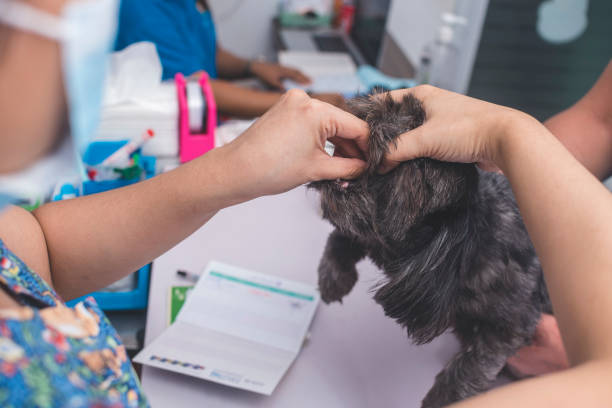
-
Fatigue and Tiredness
- Dogs may seem lethargic or stressed as their system adjusts to the treatment.
-
Passing Worms in Stool
- This is a positive sign, indicating the medication is effective in expelling the parasites from the digestive tract.
-
Rare Allergic Reactions
- Though uncommon, symptoms like hives, itching, swelling (face or paws), and difficulty breathing may occur, requiring immediate veterinary attention.
©ashburnevet.co.za.
Click here to read about Dog behaviour before death in which we tell about its behaviour and how to end their journey peacefully.
Preventing Worm Infestations
Importance of Preventative Measures
Preventing worms is crucial for maintaining the well-being of your dog. Pet owners must remain vigilant and take proactive steps to ensure their dogs stay healthy.
Proper Medication and Dosage
Using the right deworming medication tailored to your dog’s age, weight, and health condition is essential. Always follow dosage instructions and consult your veterinarian for guidance to avoid the risks of overdosing.
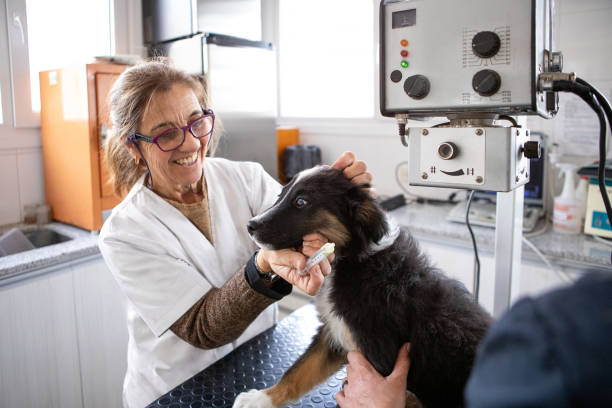
Observing Behavior and Reactions
Monitor your dog for any unusual behavior or adverse reactions after administering medication. Promptly contact your vet if you notice signs of allergic reactions or sensitivity to the treatment.
Natural Alternatives and Sensitivities
Some natural alternatives for parasite prevention can be considered but should be discussed with your veterinarian for safety and efficacy, especially if your dog is sensitive to traditional medications.
Hygiene Practices to Reduce Risk
Maintaining proper hygiene is vital. Regularly dispose of dog feces to prevent the spread of parasite eggs in the environment and reduce the risk of reinfection.
Regular Veterinary Check-Ups
Schedule regular check-ups with your veterinarian to assess your dog’s overall health and address any worm-related concerns. This helps ensure your canine companion remains safe and healthy.
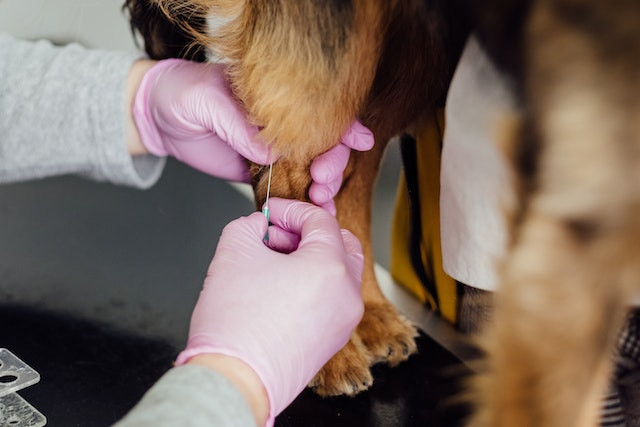
Addressing Post-Worming Concerns in Dogs
Common Signs Your Dog Feels Unwell After Deworming
After a worming treatment, your dog may exhibit mild symptoms like tiredness or reduced appetite. Regular check-ups and a balanced diet can ease these side effects. Monitor your pet closely to ensure they recover quickly and stay comfortable.
Temporary Reactions to Deworming Treatment
Reactions like lethargy, vomiting, or diarrhea are common after deworming and typically resolve in a few hours. These symptoms occur as the medication works to eliminate parasites. Contact your vet if the intensity or duration seems unusual.
Understanding Side Effects of Deworming Tablets
Deworming may cause mild side effects such as nausea, drooling, or loss of appetite. These are typically short-lived and manageable. Always follow your vet’s instructions to minimize discomfort and ensure the medication’s effectiveness.
Helping Your Dog Recover Comfortably
Ensure your dog has access to clean water and a quiet space to rest. Offer bland meals to soothe any stomach upset. If symptoms like vomiting or lack of appetite persist for over a day, consult your veterinarian for further advice.
Final Words
Deworming is an essential step in keeping your furry friends healthy and happy. While mild and temporary side effects, such as upset tummies or passing worms in the stool, may occur, these are typically manageable. However, if you notice unusual signs like intense itching, swelling, or difficulty breathing, which could indicate a rare allergic reaction, consult your vet immediately for expert advice.
FAQ’S
Can dogs be sick after worming?
Yes, though uncommon, dogs may experience mild stomach upset as side effects from deworming medication.
What naturally kills worms in dogs?
Vegetables and fruits like pumpkin, carrots, sweet potatoes, apples, and papaya help expel worms due to their high fiber content.
Can humans get worms from dogs?
Yes, zoonotic infections like roundworms and hookworms can spread from dogs to humans, according to the CDC.






